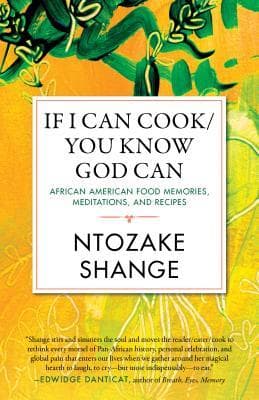
Book Review Summary: If I Can Cook/You Know God Can: African American Food Memories, Meditations, and Recipes (Celebrating Black Women Writers)
Introduction
In this article, we will delve into the captivating book "If I Can Cook/You Know God Can: African American Food Memories, Meditations, and Recipes (Celebrating Black Women Writers)" by Ntozake Shange. This book offers a delightful tribute to African American cuisine, exploring its rich history and cultural significance. Through personal anecdotes, evocative prose, and mouthwatering recipes, Shange takes readers on a journey that celebrates the culinary traditions of the African Diaspora. In this article, we will provide an introduction to the book, highlight the author's background, analyze readers' views, and summarize the reasons for recommending this remarkable work.
About Ntozake Shange
Ntozake Shange, the author of "If I Can Cook/You Know God Can," is an accomplished African-American playwright, performance artist, and writer. She is best known for her Obie Award-winning play "for colored girls who have considered suicide/when the rainbow is enuf." Shange has received numerous accolades throughout her career, including fellowships from the Guggenheim Foundation and the Lila Wallace-Reader's Digest Fund, as well as a Pushcart Prize. Her writing style is characterized by her poetic and lyrical approach to storytelling, which seamlessly blends history, memory, and personal experiences.
Analysis of Views
- Food as a lens for understanding the black diaspora: Readers appreciate how Shange uses food as a lens to explore the African diaspora. The book offers a unique perspective on the history and cultural influences that have shaped African American cuisine.
- Evocative and lyrical writing style: Many readers find Shange's writing style evocative and lyrical. Her ability to blend prose with history, memory, and lore creates a captivating reading experience.
- A cookbook and a history lesson: The book combines elements of a cookbook with historical insights. Readers appreciate the way Shange weaves together recipes with personal stories and scholarly analysis to provide a comprehensive understanding of the African Diaspora.
- Food for the soul: Beyond recipes, readers find that the stories and anecdotes in the book resonate deeply with their own experiences. The book serves as a source of inspiration and reflection on the importance of food in our lives.
- Enlightening read for non-African Americans: Some readers who are not African American find the book enlightening. It provides a broader perspective on the history of slavery and its impact on different regions of the Americas.
Reasons for Recommendation
- Celebration of African American cuisine: Readers recommend "If I Can Cook/You Know God Can" for its celebration of African American cuisine. The book showcases the richness and diversity of African American food traditions, making it a joyful exploration of culinary heritage.
- Personal connection to family history: Many readers appreciate Shange's intense connection with her family's history. Her ability to convey their struggles, joys, and cultural influences resonates deeply with readers who value their own family histories.
- Engaging storytelling and colloquial language: Shange's use of colloquial language and personal anecdotes adds depth and flavor to her writing. Readers enjoy her conversational style, which makes the book accessible and engaging.
- Illustrates food's role in identity: The book effectively illustrates how food plays a significant role in shaping identity. Shange's exploration of food influences within the context of the African Diaspora resonates with readers who appreciate the power of food in defining cultural identity.
Conclusion
"If I Can Cook/You Know God Can: African American Food Memories, Meditations, and Recipes (Celebrating Black Women Writers)" by Ntozake Shange is a must-read for anyone interested in exploring African American cuisine and its cultural significance. Through personal anecdotes, evocative prose, and mouthwatering recipes, Shange takes readers on a journey that celebrates the culinary traditions of the African Diaspora. The book offers a unique perspective on history, food influences, and personal experiences that resonates deeply with readers. Whether you are a food enthusiast or simply interested in exploring African American culture, this book is sure to leave a lasting impression.